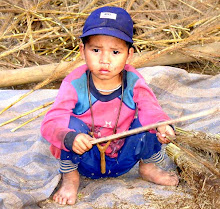If we are going to support a particular mission program that works with the poor one of the things we should research is whether or not they are creating dependency in their efforts to lift people out of poverty. We can certainly help someone out of poverty by simply giving them an unending source of money. But then we have only made them dependent upon us for that "lifeline" and it could never go much beyond our own means. It is better if we can give them ways to escape poverty without creating dependency upon rare outside sources.
If you give a man a fish you feed him for a day. If you teach a man to fish you feed him for a lifetime.
Do you remember that proverb? It's a good one. Paul teaches us in 2 Thessalonians 3:7-12:
"We were not idle when we were with you, nor did we eat anyone's food without paying for it. On the contrary, we worked night and day, laboring and toiling so that we would not be a burden to any of you. We did this, not because we do not have the right to such help, but in order to make ourselves a model for you to follow. For even when we were with you, we gave you this rule: 'If a man will not work, he shall not eat.' We hear that some among you are idle. They are not busy; they are busybodies. Such people we command and urge in the Lord Jesus Christ to settle down and earn the bread they eat."
He also says in 1 Thessalonians 4:11-12:
"Make it your ambition to lead a quiet life, to mind your own business and to work with your hands, just as we told you, so that your daily life may win the respect of outsiders and so that you will not be dependent on anybody."
Paul's goal is not that people would simply become recipients of missionary's help, but that they would be better workers than before, because of their faith, and that they would be able to contribute, not just consume.
Many people talk about two types of mission work--helping people spiritually (evangelism, discipleship, church planting, etc.) and helping people physically (relief efforts, feeding programs, micro financing, agriculture, water systems, etc.) And we tend to think of dependency in the realm of physical help. But dependency can happen in two ways:
1) Making people dependent upon us for their physical needs.
2) Making people dependent upon us for the spiritual needs.
If we do a program where we feed people--Are there ways to help them to be able to feed themselves?
If we do a church plant where we teach/preach to people--Are there ways to train a few to be able to teach themselves?
If we send out national evangelists and support them with our funds--Are there ways to help them to be able to support themselves or for the local churches to be able to support them?
These are the questions and issues we must address to get around creating dependency.
Tomorrow I'll attempt to answer the question: "What's wrong with dependency? If we are doing something to help people, isn't that a good thing?"
Monday, March 9, 2009
Subscribe to:
Post Comments (Atom)










I have 2 kids. With my first child, I instinctively helped with everything, the second, for many reasons, was simply more independent. Because my first child became used to dependency, we have all had to unlearn some bad habits, and it can be frustrating and painful at times. Teaching dependence on anyone or anything but God is a losing proposition.
ReplyDelete